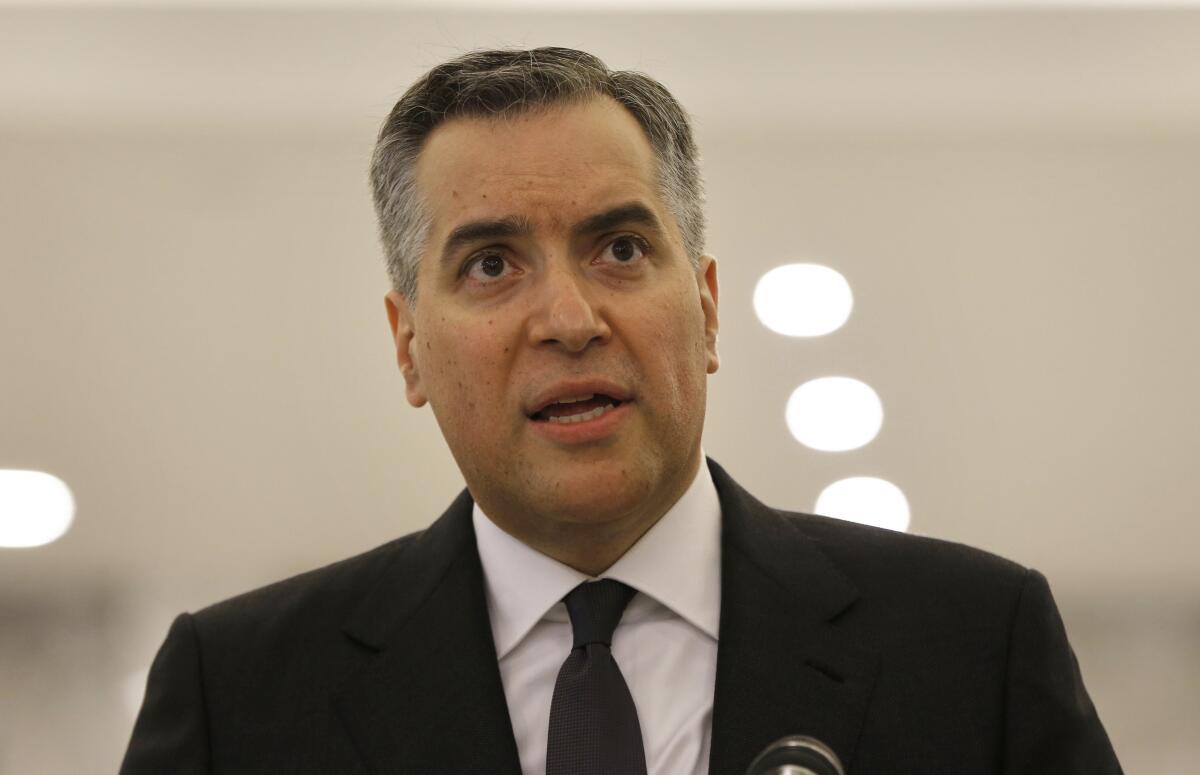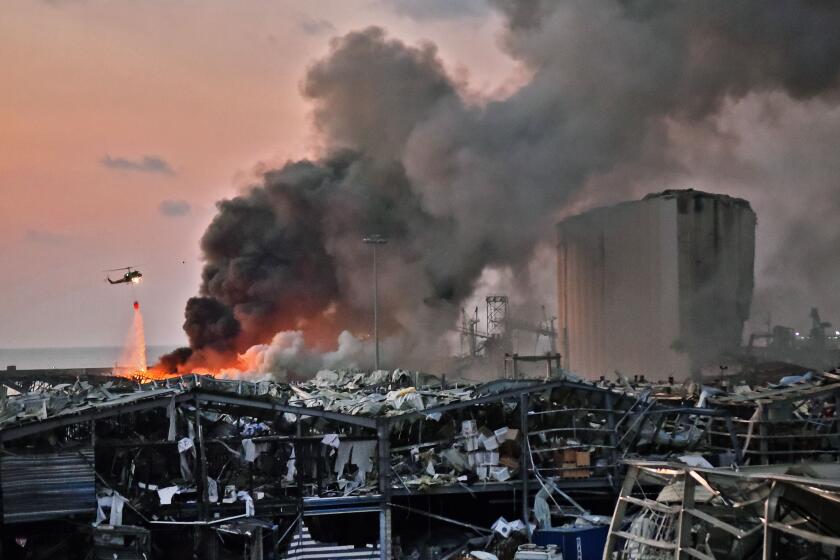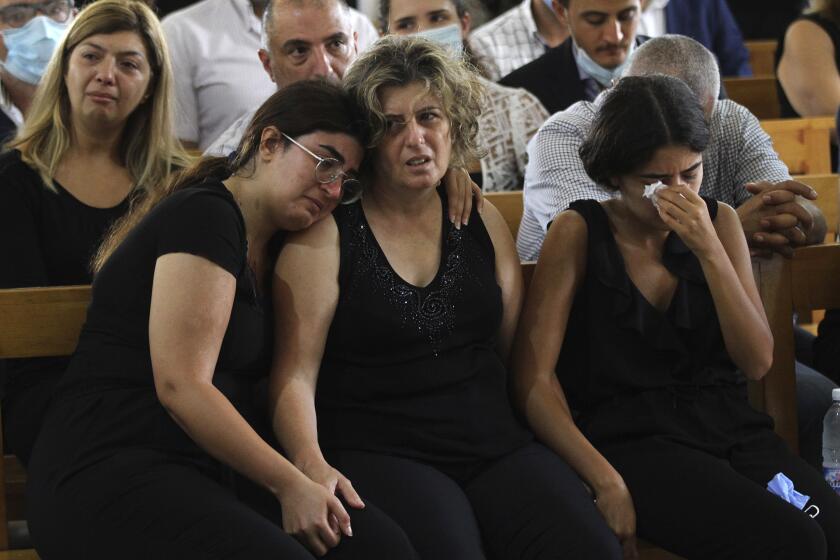Lebanese prime minister-designate steps down amid impasse over forming a government

- Share via
BEIRUT — Lebanon’s prime minister-designate, Mustapha Adib, stepped down on Saturday, sinking a French-led initiative to break a political deadlock and pull the country out of a seemingly perfect storm of crises.
Lebanon is bankrupt, with its currency plunging to a fifth of its previous value against the dollar; anti-government protests have persisted for almost a year; an explosion last month at Beirut’s port, blamed ultimately on endemic corruption and mismanagement by Lebanon’s venal political class, killed hundreds and leveled whole neighborhoods.
Adib was designated premier in the weeks after the explosion in an arrangement under the stewardship of French President Emmanuel Macron that the French leader said in an interview with Politico in September was a “last chance for this system.”
An obscure onetime ambassador to Germany, Adib was tasked with quickly forming a so-called technocratic Cabinet — a process that in Lebanon usually takes months — that would satisfy international donors, begin a comprehensive reform program set by Macron and unlock urgently needed aid.
Los Angeles Times reporter Nabih Bulos was less than 500 yards from the center of the massive explosion in Beirut. He lived to tell the tale
But during weeks of consultations, Adib repeatedly failed to present a Cabinet lineup, despite having initially received the backing of the country’s political parties.
That backing, said Adib in a televised address on Saturday, was no longer there.
“It became clear to me that this agreement on whose basis I accepted this national task ... was no longer present,” Adib said. “Since a Cabinet in the parameters I had set was judged beforehand to fail, I recuse myself from continuing the mission of forming a government.”
He did not elaborate on which party had obstructed the initiative. But in recent days, Lebanese President Michel Aoun blamed the stalemate on the intransigence of his allies, the Amal party and Hezbollah; the latter is an Iran-backed Lebanese Shiite political party and armed faction that the U.S. designates as a terrorist organization.
The two parties, known here as the Shiite Duo, had refused to allow Adib to name his own finance minister after the United States levied sanctions earlier this month on two Hezbollah-friendly officials; it was the first time a U.S. administration had penalized Lebanese allies of the group.
Aoun accepted Adib’s resignation on Saturday, saying he would take “appropriate measures” and that the French initiative “was still ongoing.”
Lebanon is governed under a power-sharing arrangement established after the country’s devastating 15-year civil war ended in 1990. It brought peace, but it also turned warlords representing the country’s 18 recognized sects into political leaders, each intent on funneling benefits to their constituencies.
Under that agreement, Lebanon’s president must be a Maronite Christian, its prime minister a Sunni Muslim, and the head of parliament a Shiite.
That sectarian divide persists down the chain, turning Cabinet formations into months-long bouts of horse-trading between parliamentary blocs that are seen as more beholden to their foreign backers than their own country.
Adib’s resignation leaves Lebanon with few options and even less time. After Adib’s announcement, the Lebanese lira cratered to 8,150 pounds to the dollar, a seven-week low. The country’s foreign currency reserves are dangerously low, with officials warning that public subsidies on fuel, essential foodstuffs and medicine will soon have to be cut off. Poverty is expected to affect most of the country’s 6.8 million people.
Meanwhile, there is the growing threat of the coronavirus, with the country reaching almost 34,000 confirmed cases on Saturday and recording its highest ever daily case rate at more than 1,140 new infections.
The backdrop of the slow-motion collapse is the Aug. 4 blast, which to many seemed a lethal symbol of a political order driving the country to oblivion.
The explosion was caused by the detonation of 2,755 tons of ammonium nitrate, fireworks and fuel barrels stored for years in Beirut port. The resulting pressure wave killed almost 200 people and left an estimated 300,000 homeless.
Almost two months since the cataclysm, an investigation has yet to assign blame.
Saad Hariri, Lebanon’s top Sunni politician and an opponent of Hezbollah, excoriated the two groups — without naming them — for obstruction, in a statement on Saturday.
“We say to those who applaud today the fall of … Macron’s initiative that you will bite your fingers with regret,” said Hariri in a statement, adding that the “insistence on keeping Lebanon hostage to foreign agendas is a matter beyond our power.”
Donors, including the International Monetary Fund, have insisted that no aid will come to Lebanon without serious reforms, including the formation of a government composed of specialists unhampered by party affiliations.
But the urgency of the various threats facing the country have failed to sway politicians, said Jan Kubis, the United Nations’ special coordinator in Lebanon.
“Such a degree of irresponsibility, when the fate of #Lebanon and its people is at stake! Politicians, have you really scuppered this unique chance created by France?” tweeted Kubis on Saturday.
“When will you finally stop playing your usual games, listen to the cries and needs of the people, prioritize the future of #Lebanon?”
Through tears in Beirut, Lebanese survivors share stories of missing loved ones
More to Read
Sign up for Essential California
The most important California stories and recommendations in your inbox every morning.
You may occasionally receive promotional content from the Los Angeles Times.
















